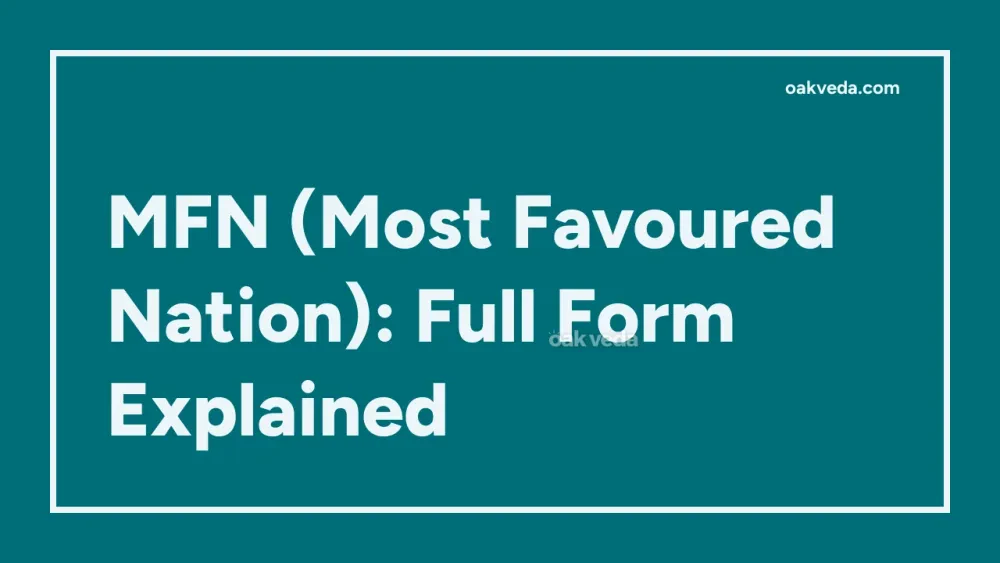
What is the Full Form of MFN?
The full form of MFN is Most Favoured Nation. This term is widely used in international trade and diplomacy, representing a crucial concept in global economic relations.
What is Most Favoured Nation?
Most Favoured Nation (MFN) is a status granted by one nation to another in the context of international trade. It signifies that the country receiving MFN status must be given the best trade terms that the granting nation extends to any other country. This principle ensures non-discrimination in trade relations among World Trade Organization (WTO) members.
Origin and Development of Most Favoured Nation
The concept of MFN has its roots in 17th-century European trade practices. However, it gained significant prominence in the 20th century with the establishment of the General Agreement on Tariffs and Trade (GATT) in 1948, which later evolved into the WTO in 1995. The MFN principle became a cornerstone of the multilateral trading system, promoting fair and equal treatment among nations.
How does Most Favoured Nation work?
The MFN principle operates on the basis of equal treatment. When a country grants MFN status to another, it agrees to provide that nation with the best trade terms it offers to any other country. This includes:
- Lowest tariffs on goods
- Highest import quotas
- Fewest trade barriers
For example, if Country A reduces tariffs on a product from Country B, it must extend the same reduction to all other countries with MFN status.
Functions of Most Favoured Nation
The MFN principle serves several crucial functions in international trade:
- Promoting fairness: It ensures that all trading partners are treated equally, preventing discrimination.
- Simplifying trade negotiations: Countries don't need to negotiate separate agreements with each trading partner.
- Encouraging competition: By leveling the playing field, MFN status promotes healthy competition among nations.
- Fostering global economic integration: It helps create a more interconnected and harmonized global trading system.
Applications of Most Favoured Nation
MFN status is applied in various contexts within international trade:
- Bilateral trade agreements: Countries often include MFN clauses in their bilateral trade deals.
- WTO framework: All WTO members are required to extend MFN treatment to each other, with some exceptions.
- Service sector: The principle also applies to trade in services under the General Agreement on Trade in Services (GATS).
- Intellectual property: MFN treatment is extended to intellectual property rights under the Agreement on Trade-Related Aspects of Intellectual Property Rights (TRIPS).
Features of Most Favoured Nation
Key features of the MFN principle include:
- Non-discrimination: All trading partners are treated equally.
- Automatic extension: Benefits given to one country are automatically extended to all MFN partners.
- Reciprocity: MFN status is typically granted on a reciprocal basis.
- Exceptions: Certain exceptions are allowed, such as for regional trade agreements or developing countries.
Benefits of Most Favoured Nation
Granting MFN status offers several advantages:
- Market access: It provides broader access to global markets, especially beneficial for smaller or developing nations.
- Cost reduction: MFN status can reduce export costs, making goods more competitive in international markets.
- Lower customs duties: Imported goods from MFN countries often face reduced tariffs.
- Economic efficiency: It promotes the efficient allocation of resources on a global scale.
- Diplomatic relations: MFN status can strengthen diplomatic ties between nations.
Limitations or Challenges of Most Favoured Nation
Despite its benefits, the MFN principle faces some challenges:
- Erosion of preferences: As more countries receive MFN status, the relative advantage for each country diminishes.
- Complexity in implementation: Ensuring consistent application across all trade partners can be challenging.
- Political considerations: Countries may hesitate to grant MFN status due to political or strategic reasons.
- Exceptions and loopholes: Various exceptions to MFN treatment can complicate its application.
Future Developments in Most Favoured Nation Principle
The future of the MFN principle is likely to evolve with changing global trade dynamics:
- Digital trade: Adapting MFN principles to the growing digital economy and e-commerce sector.
- Services trade: Expanding and refining MFN application in the increasingly important services sector.
- Environmental considerations: Integrating environmental standards into MFN frameworks.
- Bilateral vs. multilateral approaches: Balancing MFN principles with the rise of bilateral and regional trade agreements.
FAQs on MFN Full Form
-
Is MFN status permanent? No, MFN status can be revoked or modified based on changing diplomatic or economic relations between countries.
-
Do all WTO members automatically have MFN status with each other? Generally, yes. However, there are exceptions, such as for developing countries or regional trade agreements.
-
Can a country have different levels of MFN status with different partners? No, the essence of MFN is equal treatment. However, exceptions exist within WTO rules.
-
How does MFN status differ from preferential trade agreements? MFN ensures equal treatment among all partners, while preferential agreements offer better terms to specific countries.
-
Can non-WTO members benefit from MFN treatment? Yes, countries can extend MFN treatment to non-WTO members through bilateral agreements.
In conclusion, the full form of MFN - Most Favoured Nation - represents a fundamental principle in international trade. By promoting fairness and non-discrimination, it plays a crucial role in fostering global economic cooperation and development. As the world economy continues to evolve, the MFN principle is likely to adapt, ensuring its relevance in shaping future trade relations.
You may be interested in:
- PO (Full Form): Probationary Officer and Post Office
- TIN (Taxpayer Identification Number) Full Form
- CAD (Computer-Aided Design): Full Form and Overview
- DVT (Deep Vein Thrombosis): Full Form and Explanation
- MMR (Measles, Mumps, and Rubella) Full Form
- ICU (Intensive Care Unit): Full Form and Importance

